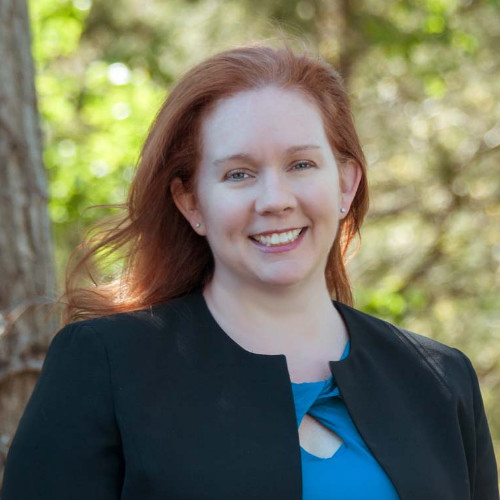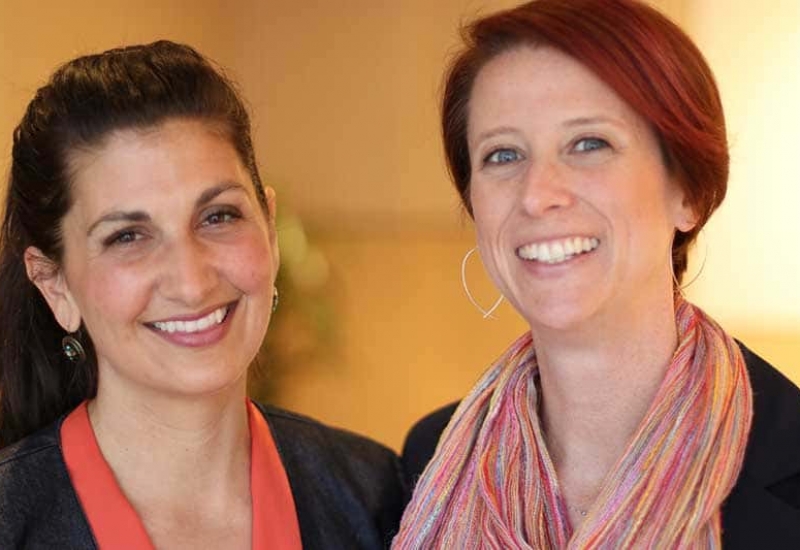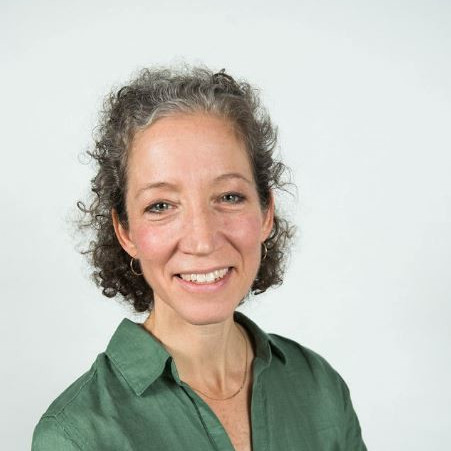E-Newsletter
Spotlighting the women leaders who own and run Fairfax County businesses

Women have come a long way in the business world in the past 50 years — in Fairfax County as well as the rest of the nation. The Fairfax County Economic Development Authority is proud to spotlight that progress during Women’s History Month.
In 1972 there were 535 woman-owned firms in Fairfax County, most of which were solo-run enterprises. A mere 37 of these firms classified as employer firms, employing a total of 195 employees.
Fast forward to 2012, and the latest available statistics from the U.S. Census Bureau show there were 41,905 woman-owned firms in Fairfax County that year. In 2017, the Census Bureau said there were 5,373 woman-owned employer firms with more than 52,000 employees.
In 2021, the number of women running businesses on the Fortune 500 hit an all-time record: 41 women nationwide, according to Fortune. In Fairfax County, women are leading three of the 10 Fortune 500 companies based here: Kathy Warden, chairman, CEO and president, Northrop Grumman (Falls Church area); Phebe Novakovic, chairman and CEO, General Dynamics (Reston); and Nazzic S. Keene, CEO, Science Applications International Corp. (Reston).
In addition, Carey Smith is president and CEO of Parsons (Centreville), a Fortune 1000 company. And Amy Gilliland is president of General Dynamics’ subsidiary General Dynamics Information Technology (Falls Church area).
More examples of female CEOs in Fairfax County: Mary McDuffie is president and CEO of Navy Federal Credit Union (Vienna), which has 20,500 employees, $151.1 billion in assets and 11.1 million members. It is the largest credit union in the world. Also in the financial services sector, Shaza Andersen is founder and CEO of Trustar Bank (Great Falls), which opened in July 2019 and was the first bank to be chartered and opened in Virginia in more than 10 years.
In the information technology sector, Pallabi Saboo is founder and CEO of Tysons-based services firm Harmonia Holdings Group. Saboo is also a Fairfax County Economic Development Authority Commissioner. Poupak Afshar is CEO of Easy Dynamics, a technology company in Tysons that is working to get more women in tech.
In the education technology sector, Laura Ipsen is president and CEO of Ellucian (Reston), a provider of software and services designed for higher education that works with more than 2,500 institutions in nearly 50 countries.
Jennifer Taylor is president and CEO of the Northern Virginia Technology Council, which works to build and support the technology ecosystem throughout the region. Julie Coons is president and CEO of the Northern Virginia Chamber of Commerce, which has advocated for business growth since 1925 and is one of the most influential business organizations in the national capital area.
Female CEOs in other Northern Virginia Economic Development Alliance jurisdictions include Julie Sweet, the CEO and chair of Accenture and is based in the global company’s Arlington office.
In Loudoun County, Sheila Johnson is CEO of Salamander Hotels & Resorts in Middleburg, and Kristina Bouweiri is the owner, president and CEO of Reston Limousine in Sterling.
In terms of ownership, the largest woman-owned company in Fairfax County, and second largest in the Washington, D.C., region, is Omega World Travel (Fairfax), when ranked by total revenue in 2020, according to the Washington Business Journal. Gloria Bohan, president and CEO of Omega World Travel, launched the company in 1972 as a small-town storefront travel agency. With 285 current employees, the 100 percent woman-owned company had a total revenue of $248 million in 2020.
Other entrepreneurs who fully own the largest women-owned firms in Fairfax County include the following, according to the Washington Business Journal: Myrian Villarin, founder and CEO, NVE (Reston); Angela Wilson, founder and CEO, SeKON Enterprises (Reston); Vanitha Khera, CEO, Creative Systems and Consulting (Tysons); Caitlin Vargas-Cissel, CEO, Quadrant (Reston); Mona Kaur, president, FreeAlliance.com (Tysons); and Sophia Tong, CEO, T&T Consulting (Falls Church area).
This year’s Women’s History Month theme is Women Providing Healing, Promoting Hope, a tribute to the ceaseless work of caregivers and frontline workers during this ongoing pandemic and also a recognition of the thousands of ways that women of all cultures have provided both healing and hope throughout history to the present day.
In recognition of this theme we are highlighting three Fairfax County-based women-owned small businesses that have worked to help the community during the ongoing pandemic: Frontier Kitchen, Rowan Tree and 100 Bowls of Soup.

Brenda Cromer, CEO, Frontier Kitchen
Frontier Kitchen
Based in Lorton and Chantilly, Frontier Kitchen is a commercial kitchen and food business accelerator. Brenda Cromer, the co-founder and CEO of Frontier Kitchen, is a former intelligence analyst with a specialty in organizational analytics. Since launching Frontier Kitchen in 2015, Cromer has worked with over 300 entrepreneurs and helped them grow many multi-million dollar companies.
“Frontier Kitchen is purposeful in helping everyone start their new food business and our price structure makes it easy. A lack of capital keeps many women from business–however Frontier Kitchen’s low cost of entry without long term commitment and on-site expert consultants makes business accessible for anyone willing to work for it,” said Cromer. “Women are some of the hardest working business owners–over 52 percent of our businesses are women-owned companies and 51 percent of our graduated companies are also women-owned showing that, when the field is level women can drive the success of food companies.”
Frontier Kitchen helped many area food service companies at the height of the pandemic and is continuing this program.
“During the pandemic, when so many food service companies were going out of business, Frontier Kitchen was dedicated to making sure our new companies could pivot and survive and do good work for the community,” Cromer explained. “Frontier Kitchen teamed with Fairfax County, FACETS and the Islamic Circle of North America to hire women-owned small businesses to make food for needy families. By hiring our small businesses to do this work, Frontier Kitchen’s small businesses fed over 1,000 meals to families in need and helped new businesses survive the pandemic. Two of those businesses have since graduated into their own spaces and continue to operate independently.”
Click here to listen to a podcast in which Cromer talks about how Fairfax County helped save companies during the pandemic.

Amy Dagliano and Kate Viggiano Janich, co-founders, Rowan Tree
Rowan Tree
With the goal of fostering female entrepreneurship, Rowan Tree, a Herndon-based co-working business, was co-launched by Amy Dagliano and Kate Viggiano Janich in 2019. Its members are 99 percent women, but it’s welcome to all.
Rowan Tree offers its members a place to work outside of the home while accessing a thriving community of support. With an open workspace, meeting rooms, onsite yoga, and workshops, members can grow their businesses and networks while infusing wellness, professional development, and creative and personal growth into their daily lives.
In addition, Rowan Tree supports a diverse and inclusive environment by offering a scholarship to local entrepreneurial women who may face financial barriers to membership.
“By nature, women tend to be collaborative. We know we are stronger together. That’s why we created Rowan Tree. We wanted to bring women business owners together to support each other as they pursue their business goals and seek personal growth and fulfillment,” said Dagliano. “We are a co-working space, but we are much more than desks and meeting rooms. We are a community geared for women in business, but open to all. We infuse a mix of business, wellness, creativity, laughter, and self-health into our workspace, workshops, and community.”
During the pandemic, Rowan Tree’s operations shifted to operations to virtual and provided support to its members, both for their business operations and mental wellness during the shutdown. Members are now going back to working at the facility.
As a testimonial to Rowan’s Tree’s impact during the pandemic, Meg Donnelly, a licensed massage therapist and movement coach in Herndon wrote: “Without Rowan Tree, during the pandemic, I think I would have slowed down and stopped. Instead, I was able to not only thrive but create some new and innovative online programs for my clients and I owe a lot of that success to Rowan Tree. I love being in the treehouse whether it’s virtually or in-person.”
“We know it takes a village. Our members share knowledge, resources, and referrals. And, with a mindset of growth and kindness, our diverse group of members inspire and support one another, creating healthier lives and businesses in Fairfax County, Northern Virginia, and beyond,” Dagliano said.

Katharine Mardirosian, founder, 100 Bowls of Soup
100 Bowls of Soup
Herndon-based 100 Bowls of Soup makes fresh soup and bone broth from scratch using local and organic ingredients. A variety of vegan and meat-based soups and broths are available for sale at the Herndon kitchen and retail store. All of the products are gluten free and dairy free.
The founder of 100 Bowls of Soup, Katharine Mardirosian, said she was inspired to start the business from the flavorful soup than she had in her Romanian mother-in-law’s kitchen. In 2009, Mardirosian launched 100 Bowls of Soup with the idea of sharing simple, nourishing soups and broths with friends and family. She began by cooking soup in a local church kitchen and selling it at several artisanal food stores and the Reston Farmer’s Market. Then she moved to a shared commercial kitchen space at Maple Avenue Market in Vienna. In 2015, the company’s continued growth required more kitchen space, and Mardirosian opened the dedicated kitchen in Herndon.
Commenting on Women’s Business Month, Mardirosian said: “While these qualities are not exclusive to women-owned businesses, in my experience, many women owned businesses start with a few simple questions — what would I want as a customer, what kind of work motivates me, what kind of environment would I like to work in and with whom? This is because women tend to be more empathetic, see the value in nurturing people and building positive relationships. I’ve found women-owned businesses often set higher, more purposeful goals for their businesses. Equally important to making a profit is creating something – be it a product or service — that enriches the community and benefits all stakeholders involved including customers, employees and suppliers.”
When the pandemic hit in March of 2020, the company stepped up their giving efforts, Mardirosian commented.
“At 100 Bowls of Soup our mission is to nourish our community. This includes those most in need. When the pandemic hit in March of 2020 we decided to step up our giving efforts, pledging to donate 100 bowls of soup each week to Cornerstones, our local Reston based food pantry,” Mardirosian explained. “Our donations continue to this day. Since March of 2022 we have donated over 10,000 bowls of soups to Cornerstones. We plan to continue to make donations of 100 bowls of soup each week for the foreseeable future.”
Women-owned businesses propel our economy forward
In recognition of Women’s History Month, the U.S. Small Business Administration posted a few national statistics about women business owners:
- In the past five years, total employment by women-owned businesses rose 8 percent, and 1.8 percent for all other businesses (NAWBO)
- 5.4 million firms are majority-owned by women of color in the U.S. (NAWBO)
- In 2020, woman-owned businesses executed 344,000 contracts across the U.S., with 4,591 contracts specifically providing critical COVID-19 support (PERFORMANCE.GOV)
- In 2021, 1.1 million of all businesses were owned by women (CENSUS)
News Travels Fast
Stay ahead of the curve with the latest business news from Northern Virginia. Receive updates on moves, incentives, workforce, events and more.